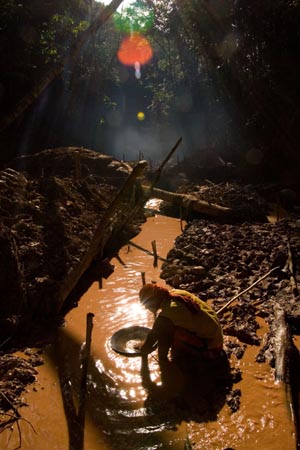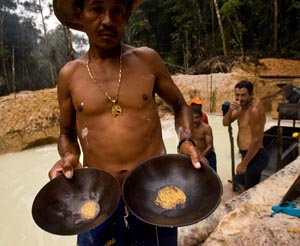Gold Rush Tears Up a Patch of the Amazon
Gold Rush Tears Up a Patch of the Amazon
An Old-Fashioned Gold Rush, Driven by Internet, Tears Up a Patch of Brazil’s Amazon Jungle
By MICHAEL ASTOR
The Associated Press
February 3, 2007
ELDORADO DO JUMA, Brazil – It’s a gold rush in the Amazon jungle, driven by the Internet. Speeding past unbroken walls of foliage, a motorboat packed with gritty prospectors veers toward the shore of the Juma river and spills its passengers into a city of black plastic lean-tos veiled by greasy smoke. All around them are newly dug pits, felled trees, misery and tales of striking it rich. This is Eldorado do Juma, scene of Brazil’s biggest gold rush in more than 20 years.
Drawn by a Brazilian math teacher’s Web site descriptions of miners scooping up thousands of dollars in gold, between 3,000 and 10,000 people have poured in since December, cutting down huge trees, diverting streams and digging ever-deeper wildcat mines, in an area that only months ago was pristine rain forest.
Hundreds of mud-covered men with picks and shovels hack at the earth, marking their tiny plots with tree branches and string. Others feed dirt into wooden troughs and the residue into pans. A lucky few will end up with tiny nuggets and flakes of gold to sell for $530 an ounce in the town of Apui, about 50 miles north.
Even the cooks, cleaners and porters serving the new industry are making about six times the minimum wage.

A miner looks for gold at a deserted stretch of the Eldorado do Juma wildcat gold mine, near Apui, in the Brazilian Amazon. (AP / Victor R. Caivano)
A miner shows gold he has found during the day at the Eldorado do Juma, near Apui, in the Brazilian Amazon. (AP / Victor R. Caivano) |
It’s reminiscent of Serra Pelada, a mountain that became a gargantuan hole in the jungle floor after a gold rush in the early 1980s, immortalized in Sebastiao Salgado’s photos of what looked like a hellish human anthill.
“This is even better than Serra Pelada. I’ve been mining all around the Amazon since 1978 and this is the best I’ve ever seen,” said Joao Leandro de Azedo, 70, overlooking his stake from a hammock.
Azedo said he has panned some 70 ounces of gold worth a total of $19,000 since arriving 17 days ago, including 17 ounces in a single day.
Half the proceeds went to the man who staked out his plot, and 8 percent more to Jose Ferreira da Silva Filho, who claims to own the entire “garimpo,” or wildcat mine.
Already, too many people are chasing too little gold and there isn’t enough space for all the miners at the eight main digging sites.
Price-gouging (chain saws costing around $400 in gold) is rampant and malaria is spreading in the makeshift city, nicknamed Eldorado do Juma after the Amazon’s mythical Eldorado, or city of gold. It already has bars, restaurants, barbershops, bakeries, equipment shops and jewelry stores, most of them constructed out of tree branches and tarps. A 16-room brothel is under construction.
Federal police armed with automatic weapons arrived last month, imposing a nightly curfew and cracking down on shootings but making it harder to get rich quick.
“Luckily, we caught it right at the beginning. It is a concern for everyone … that this doesn’t become another Serra Pelada,” said Walter Arcoverde of the National Department of Mineral Production.
Local people had been mining this area of the jungle state of Amazonas in relative peace until Ivani Valentin da Silva, a math teacher in Apui, posted their pictures and stories on the Internet, said Antonio Roque Longo, the mayor of Apui.
“Perhaps he didn’t have any idea of the impact it would have,” said Longo. “People see this on the Internet and they think they’re going to do the same thing. But the truth is, for every one person who strikes it rich there are 30 who go home penniless.”
Da Silva said he clearly wrote that the gold would soon run out.
“Unfortunately, no one read the article,” he said, denying any responsibility for the environmental damage being done by the thousands of fortune-seekers. His Internet posting forced federal police to pay attention, he said, and without that, “the area would be totally devastated.”
Government geologists are trying to measure the deposits, while environmental regulators struggle to prevent miners from using heavy equipment or mercury, which joins gold particles together but can ruin the rivers. The fear is that like Serra Pelada, Eldorado do Juma will end up a scarred wasteland.
Already, small rivers of mud gush from streambeds at night, suggesting that heavy-duty water jets are being used illegally, despite promises to wait for permits.
“Most of the gold that can be mined manually has already been found, but if they start using heavy machinery this place is going to explode all over again,” said Luiz Gonzaga da Conceicao, 51, a miner from Brazil’s far west.
The land reform agency says the land actually belongs to the federal government, but now that the miners are here, there’s talk of compromise authorities say they will permit pressure hoses, rock crushers and other machinery if miners police themselves and stick to an environmental protection plan.
But da Silva, the man who claims to own the whole area, says he’s working on exactly that.
“This place has a great future. There are other minerals here besides gold. We have to get organized to exploit it,” he said.
Off the record, many miners talk of threats and intimidation that ensure they pay da Silva’s 8 percent cut. Da Silva denies it and says he has his own share of headaches and unseen costs.
So far, the federal government and most miners seem content to leave him in charge, if only to provide some order.
Meanwhile, prospectors travel up and down the river and deeper into the jungle looking for “fofocas,” new finds.
“There’s gold here for sure, the problem is finding an area to work. Every spot has three or four owners now. I’m just waiting for a new fofoca and I’ll be right in the middle of it,” said Jose Francisco Mendes dos Santos, 32, who came from the neighboring state of Rondonia. “A prospector’s motto is hope, and his friend is luck.”
Gilmar Predebon reckons his gold store in Apui buys about 70 ounces of gold a day and molds them into gold ingots. He figures the mines generate between 200 and 230 ounces a day overall “a good amount of gold but nowhere near as much as you’d expect, considering all the talk.”
Gold is fetching around $650 an ounce on world markets.
Mayor Longo thinks his city of 20,000 would be better off without the mine: “Sure, it’s been good for the merchants but we have major health problems. Before the garimpo, we had malaria mostly under control here; now it’s a huge problem again.”
Others say the garimpo has improved things.
“This was a door God opened for Apui. Today the city has grown fivefold and people are flooding in from every corner of the country,” said Antonio Carlos Santos, 48, who quit his policeman job to work the mines.
On the Net:
Math teacher’s site: http://www.portalapui.com.br








